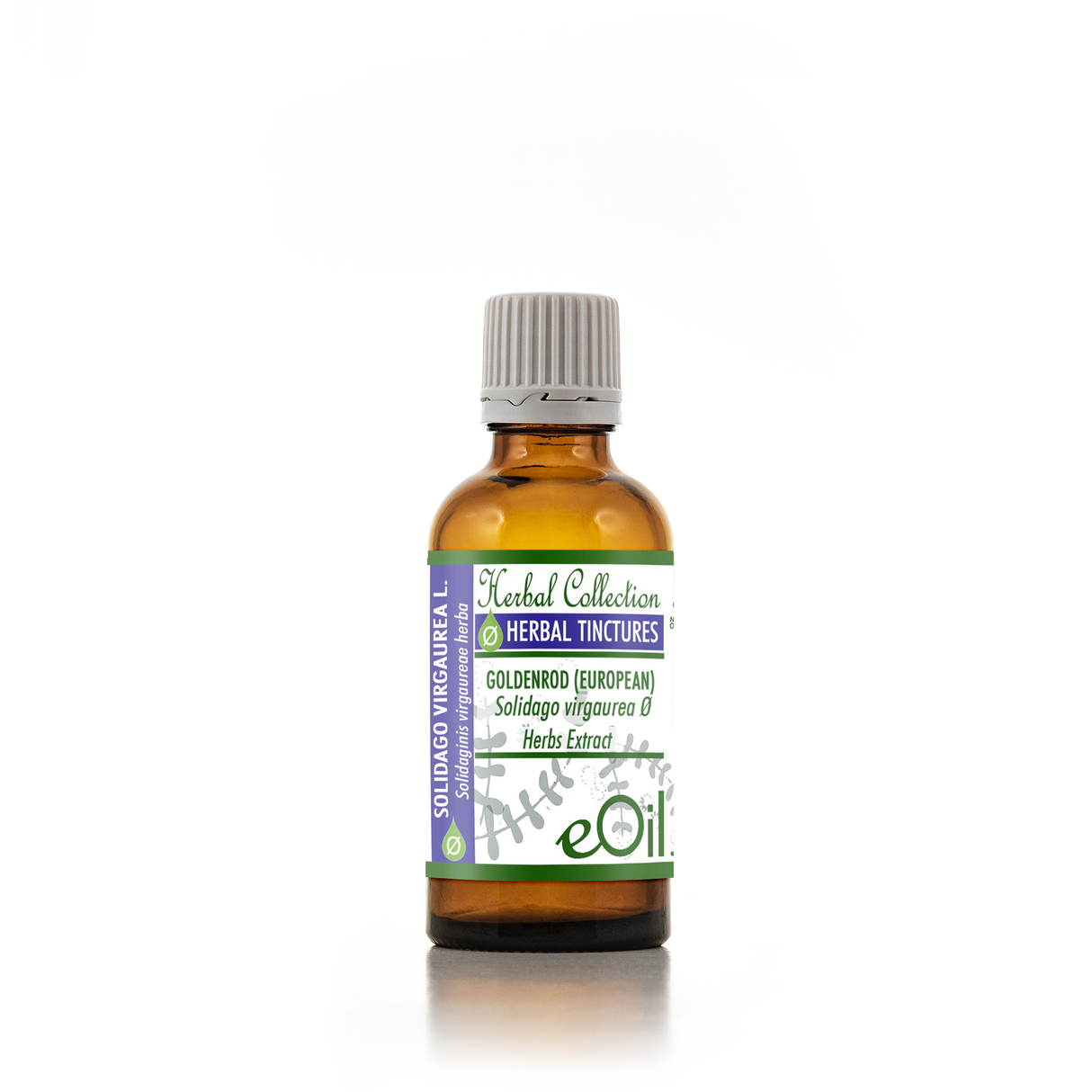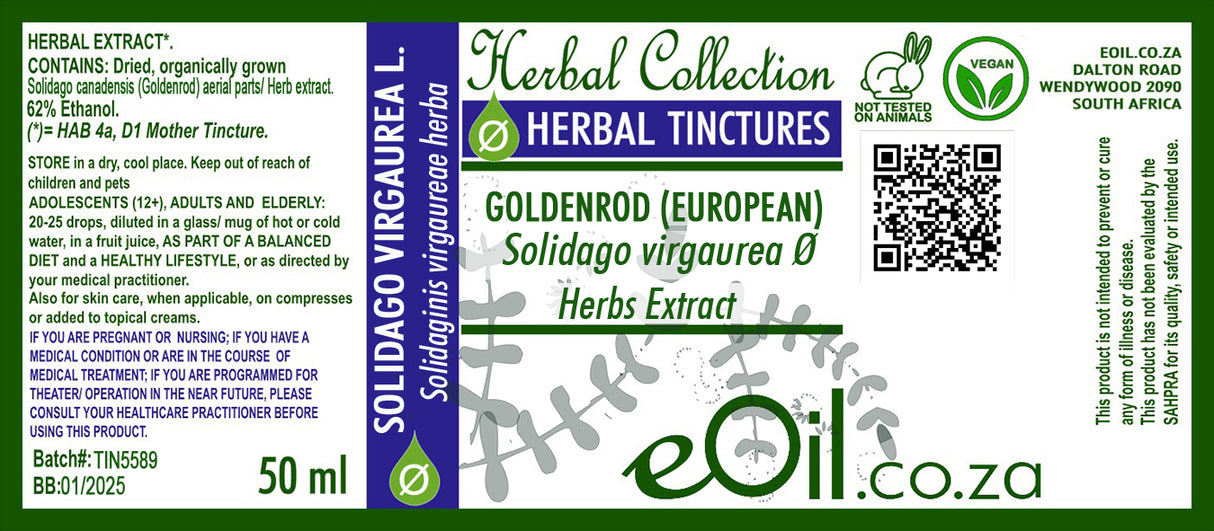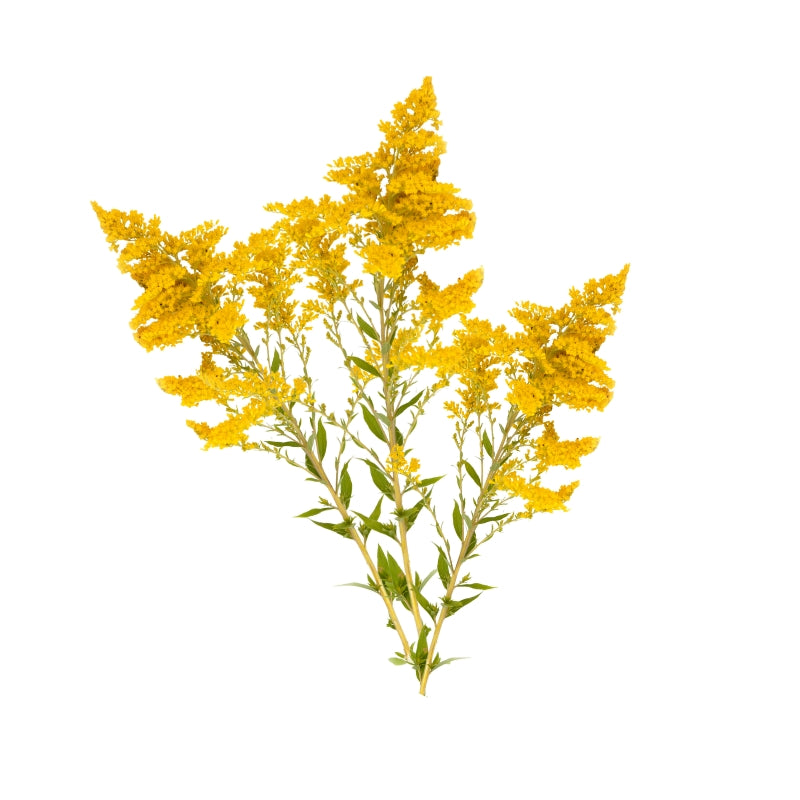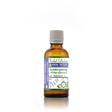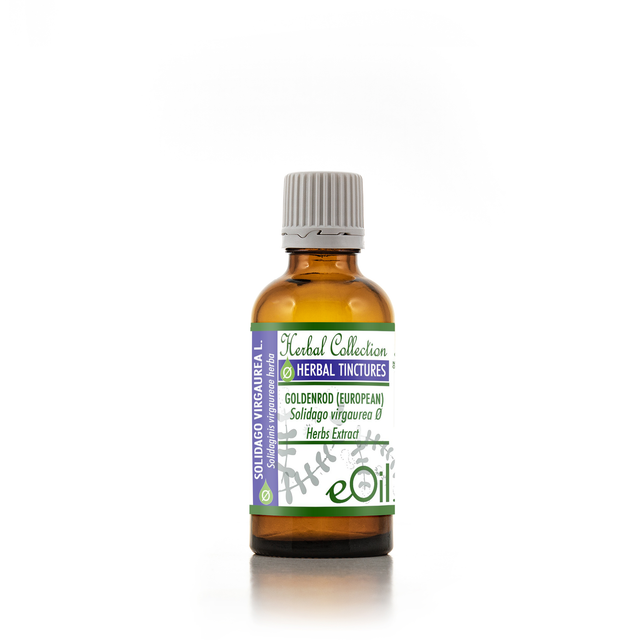Goldenrod - Liquid Herbal Extract
Goldenrod - Liquid Herbal Extract - 50 ML is backordered and will ship as soon as it is back in stock.
Description
Description
Understanding Mother Tinctures & Glycerines
Goldenrod Liquid Herbal Extract Tincture
Goldenrod tincture is a concentrated herbal extract made from the flowering tops of Solidago virgaurea, valued for its traditional use in promoting sinus clarity, respiratory comfort, and overall immune support. Known for its natural anti-inflammatory, antioxidant, and decongestant properties, goldenrod is trusted by herbalists for easing sinus congestion, soothing allergy symptoms, and supporting upper respiratory health during seasonal changes.
This gentle herbal remedy is also recognized for its diuretic action, which helps maintain urinary tract wellness by promoting healthy urine flow and the natural elimination of toxins. Rich in plant antioxidants, goldenrod tincture defends against oxidative stress and integrally supports overall wellbeing, making it a valuable choice for those seeking natural discomfort relief and resilience throughout the year.
TRADITIONALLY USED FOR
Goldenrod Solidago virgaurea Liquid Herbal Extract Tincture | Advanced Kidney, Bladder & Allergy Support | eOil.co.za
Experience targeted relief and resilience with Goldenrod (Solidago virgaurea) Liquid Herbal Extract Tincture.
This potent tincture, extracted from the flowering tops of wildcrafted Solidago virgaurea, delivers rapid, clean diuretic action, powerful anti-inflammatory support, and reliable urinary tract comfort.
Key Benefits
- Kidney & Bladder Wellness: Goldenrod is a premier natural diuretic and urinary antiseptic—gently flushing excess water, easing inflammation, and helping to maintain clean, healthy urinary passages.
- Natural Relief for Allergies & Sinuses: Traditionally used to dry up congestion, support sinus and respiratory health, and lessen seasonal allergy symptoms—ideal for hayfever, runny nose, or watery eyes.
- Detox & Water Balance: Goldenrod supports fluid balance, reduces bloating and puffiness, and is commonly included in cleanse protocols or post-illness recovery.
- Powerful Antioxidant & Anti-inflammatory: Rich in quercetin, kaempferol, and saponins, goldenrod helps soothe inflammation, relieve pain/swelling (gout, arthritis), and protect cells from oxidative stress.
- Urinary Tract & Infection Prevention: Used traditionally to help manage, prevent, and recover from urinary tract infections (UTIs) or kidney stones; often blended with marshmallow, corn silk, or uva-ursi for extra strength.
- Wound & Skin Care (Topical): Applied externally, goldenrod soothes wounds, burns, eczema, and helps stop minor bleeding.
Directions for Use
- Adults: Take 0.5–2 mL (about 10–40 drops) in water or juice, 2–3 times daily between meals.
- For sinus/allergy support: May take at first sign of symptoms. For kidney/bladder: Best combined with increased water intake.
- Do not exceed recommended dose; not for long-term use without healthcare supervision.
- Not recommended for children under 12, in pregnancy, or breastfeeding.
Cautions & Contraindications
- Do not use with known Asteraceae (daisy, ragweed) allergies or latex sensitivity—may cause rash or itching.
- Caution in high blood pressure, severe heart or kidney disease, fluid retention, or where strict fluid restriction is required.
- May interact with diuretics (“water pills”); discuss with your doctor if on medication.
- Not recommended in pregnancy/breastfeeding.
- Possible side effects: mild heartburn, stomach upset, rare skin irritation. Discontinue with any allergic or adverse reaction.
Storage
Store away from heat, sunlight, and moisture. Keep out of reach of children.
Disclaimer
This tincture is not intended to diagnose, treat, cure, or prevent any medical condition. Always consult a healthcare practitioner before use, especially if you are on prescription medication, managing chronic illness, or have allergies.
TOPICAL USE
How Goldenrod Tincture Is Used Topically
- Goldenrod is well-known for its anti-inflammatory and pain-relieving qualities. Herbalists often use goldenrod-infused oils and tinctures topically in massage oils, salves, creams, and ointments for muscle pain, joint aches, inflammation, and skin conditions.
- Tincture (alcohol extract): You may add a small amount of goldenrod tincture directly to a cream or oil, but keep the concentration low—generally around 1–2% of the total formula. This ensures the herbal benefits without excessive alcohol on the skin, which could be drying.
- Best practice: Instead of mixing the tincture directly, many herbalists prefer to create a goldenrod-infused oil (by infusing the dried herb in oil) for use as a massage oil base or for making creams/salves. This avoids the alcohol content altogether and is gentle on skin.
Mixing Tips
- If mixing tincture into an oil or cream:
- Use at low concentrations (1–2%) to avoid irritation and dryness.
- Mix thoroughly before use.
- Perform a patch test, as goldenrod (like other members of the Asteraceae family) can rarely cause allergic reactions in some sensitive individuals.
- If possible, evaporate the alcohol from a tincture before mixing with the oil—e.g., by gently heating the tincture until the alcohol is largely gone—leaving the herbal constituents behind9.
Common Uses
- Muscle rubs/salves: For sore muscles, arthritis, or bruising.
- Healing balms: For minor wounds, chapped skin, or inflammation.
- Massage oil additions: For anti-inflammatory benefits combined with other soothing botanicals.
Alternatives
- For maximum skin benefit and minimal alcohol, consider using a goldenrod-infusion in oil as your massage base. This is safer for regular or sensitive skin application and preserves the plant’s healing compounds.
Safety & Precautions
- Avoid long-term or excessive use if you tend toward dryness.
- Not recommended during pregnancy or breastfeeding unless under the guidance of a practitioner.
- Patch test first to avoid allergic skin reactions.
INFORMATION
Source : http://www.wikiphyto.org/wiki/Solidage
Reference on http://www.wikiphyto.org
Translation in English by Google Translate (go to the page of the source linked | on Chrome cellphones go on the 3 dots on the top right and select translate in your preferred language | on laptop right click your mouse and select option translate when hoovering on the page
plant name
Solidage, Goldenrod , Goldenrod (English)
International Latin denomination
Solidago virgaurea L., sometimes called Solidago virga aurea
botanical family
Asteraceae
Description and habitat
- Tall perennial grass (1 m) of the dry siliceous environments of Europe, America, northern Asia and Africa
- Purplish-red stem, radiate flower heads with yellow flowers in oblong panicles
History and tradition
- Used in the Middle Ages to bring the edges of wounds together, hence its name derived from solidare (or solidum agere ) "to strengthen"
- Native Americans used it against rattlesnake bites ("alexitera" plant: recommended against snakebites)
- Solidage Solidago canadensis and goldenrod Solidago virgaurea are two distinct species with identical properties, they are both on the French Pharmacopoeia list A
Parts used
- Flowering tops
Dosage forms available
- Flowering top tincture
- Flowering plant essential oil
Usual dosages
Composition
Main components of the plant
Flower :
- Triterpene acid genin saponins: virgaureasaponins I and II (bisdesmosidic triterpenoid saponins) [1] , [2] , solidagosaponins , derivatives of polygalacic acid (the aglycone)
- Flavonoids (1.5–2%) as flavonol glycosides : quercetin , kaempferol , isorhamnetin , quercetin-3-O-beta-glucoside ( isoquercitrin ), quercetin-3-O-beta-galactoside ( hyperoside ), quercetin -3-O-beta-rhamnoside ( quercitrin ), quercetin-3-O-beta-rutinoside ( rutin ), kaempferol-3-O-beta-rhamnoside ( afzelin ), kaempferol-3-O-beta-rutinoside ( nicotiflorin ) ,quercetin-3-/6"-O-acetyl-/-beta-glucopyranoside , kaempferol- 3-/6"-O-acetyl-/-beta-glucopyranoside , kaempferol - 3-/6"-O-acetyl-/-beta-glucopyranoside , isorhamnetin -3-/6"-O-acetyl-/-beta-glucopyranoside , isorhamnetin-3-O-beta-rutinoside ( narcissin )
- Coumarins
- Acids-phenols : chlorogenic acid ( caffeoylquinic acid ), quinic acid , hydroxycinnamic acids , caffeoyl-shikimic acid, caffeoyl-shikimic acid glucoside ( dattelic acid glucoside )
- Specific bidesmosidic compounds (0.1 to 0.5%): virgaureoside A , leiocarposide
- Clerodane -type diterpenes (solidagoic acids)
- Catechic tannins 10 to 15%
- Oses: glucose , rhamnose , galactose , rutinose
- Essential oil
- Minerals
Leaf :
Main components of buds or young shoots
Main components of essential oil
- Sesquiterpenes : germacrene D (30%)
- Monoterpenes : alpha-pinene , beta-pinene , limonene , myrcene , sabinene , phellandrene [3]
Properties
Plant properties
- Antioxidant [4]
- Antimicrobial, antibacterial [5] , [6] , [7] and antifungal ( saponins ) [8] , [9] , [10] , anti biofilm activity
- Analgesic [11] , antipyretic (combined with Populus tremula and Fraxinus excelsior ) [12]
- Anti-inflammatory [13] , especially in combination with Populus tremula and Fraxinus excelsior [14] , [15] , [16]
- Spasmolytic, anti-hypertensive [17]
- Diuretic (markedly increases diuresis) [18]
- Leiocarposide is diuretic , useful in urolithiasis [19] , analgesic and anti-inflammatory [20]
- Saponosides are detoxifying
- Antidiabetic, hypolipidemic [21]
- Inhibition of adipogenesis [22] , [23] , [24] ( flavonoids , phenolic acids )
- Astringent ( tannins )
- Rutin decreases the fragility of blood vessels
- Sedative
- Antineoplastic, antitumor [25] , cytotoxic on prostate tumors [26]
- A literature review attributes antioxidant, anti-inflammatory, analgesic, spasmolytic, antihypertensive, diuretic, antibacterial, antifungal, antiparasitic, cytotoxic, antitumor, antimutagenic, antiadipogenic, antidiabetic, cardioprotective, antisenescence properties to it [27].
Bud properties
Properties of essential oil
Directions
Indications of the whole plant (phytotherapy)
- Acute nephritis and edema of renal origin, albuminuria, oliguria
- Prostatic hypertrophy (prostate cancer?)
- Urolithiasis
- Hair protector, promotes venous circulation
- Diarrhea, enteritis
- Liver detoxification
- Overweight, obesity
Indications of the bud (gemmotherapy)
Specific indications of essential oil (aromatherapy)
- Genito-urinary inflammatory pathologies
- Arteritis
Known or suspected mode of action
- Leiocarposide is diuretic and anti-inflammatory, analgesic
- Saponosides are detoxifying
- Rutin decreases the fragility of blood vessels
- The biotransformation, by the intestinal microbiota, of certain phytochemicals that cannot cross the intestinal epithelial barrier into smaller metabolites, improves the permeability, transport and bioavailability of these compounds, without modifying their properties [28].
Usual formulations
Regulations
- French Pharmacopoeia list A (flowering top)
Possible side effects and precautions for use
- Possible allergies
- Avoid in pregnant or breastfeeding women
Bibliographic references
- Go↑ Hiller, K., Bader, G., & Schulten, HR (1987). Virgaureasaponin 1, ein neues bisdesmosidisches Triterpensaponin aus Solidago virgaurea L. Pharmazie, 42(8), 541-543.
- Go↑ Bader, G., Wray, V., & Hiller, K. (1992). Virgaureasaponin 3, a 3, 28-bisdesmosidic triterpenoid saponin from Solidago virgaurea. Phytochemistry, 31(2), 621-623.
- Go↑ Kalemba D. Constituents of the essential oil of Solidago virgaurea L. Flavor and fragrance journal, 1998, vol. 13, no.6, pp. 373-376 [1]
- Go↑ Apáti P, Houghton PJ, Kéry A. HPLC investigation of antioxidant components in Solidago herba. Acta Pharm Hung. 2004;74(4):223-31. PMID 16316050
- Go↑ Hülya Demir, Leyla Açık, E. Burcu Bali, L. Yasemin Koç, Gönül Kaynak. Antioxidant and antimicrobial activities of Solidago virgaurea extracts. African Journal of Biotechnology Vol. 8 (2), p. 274-279. [full text: http://ajol.info/index.php/ajb/article/viewFile/59785/48062 ]
- Go↑ Kołodziej, B., Kowalski, R., & Kędzia, B. (2011). Antibacterial and antimutagenic activity of extracts aboveground parts of three Solidago species: Solidago virgaurea L., Solidago canadensis L. and Solidago gigantea Ait. Journal of Medicinal Plants Research, 5(31), 6770-6779.
- Go↑ Starks, CM, Williams, RB, Goering, MG, O'Neil-Johnson, M., Norman, VL, Hu, JF, ... & Eldridge, GR (2010). Antibacterial clerodane diterpenes from Goldenrod (Solidago virgaurea). Phytochemistry, 71(1), 104-109.
- Go↑ Bader G, Binder K, Hiller K, Ziegler-Böhme H. The antifungal action of triterpene saponins of Solidago virgaurea L. Pharmazie. 1987 Feb; 42(2):140.
- Go↑ Chevalier, M., Medioni, E., & Prêcheur, I. (2012). Inhibition of Candida albicans yeast–hyphal transition and biofilm formation by Solidago virgaurea water extracts. Journal of medical microbiology, 61(7), 1016-1022.
- Go↑ Pepeljnjak, S., Kuštrak, D., & Vukušić, I. (1998). Investigation of the Antimycotic Activities of Solidago virgaurea and Solidago gigantea Extracts. In Program and Abstracts (p. K18).
- Go↑ Huber B. Therapie degenerative rheumatischer Erkrankungen. Bedarf an zusätzlicher analgetischer Medikation unter Phytodolor N [Therapy of degenerative rheumatic diseases. Need for additional analgesic medication with Phytodolor N]. Fortschr Med. 1991 Apr 10;109(11):248-50. German. PMID 1855751 .
- Go↑ Okpanyi SN, Schirpke-von Paczensky R, Dickson D. [Anti-inflammatory, analgesic and antipyretic effect of various plant extracts and their combinations in an animal model]. Arzneimittel-forschung. 1989 Jun;39(6):698-703. PMID 2476136 .
- Go↑ Amira Abdel Motaal, Shahira M. Ezzat, Mariane G. Tadros & Hesham I. El-Askary (2016) In vivo anti-inflammatory activity of caffeoylquinic acid derivatives from Solidago virgaurea in rats, Pharmaceutical Biology, 54:12, 2864-2870 , DOI: 10.1080/13880209.2016.1190381
- Go↑ Gundermann KJ, Müller J. Phytodolor--effects and efficacy of a herbal medicine. Vienna Med Wochenschr. 2007;157(13-14):343-7. PMID 17704984
- Go↑ el-Ghazaly M, Khayyal MT, Okpanyi SN, Arens-Corell M. Study of the anti-inflammatory activity of Populus tremula, Solidago virgaurea and Fraxinus excelsior. Arzneimittelforschung. 1992 Mar;42(3):333-6. PMID 1497695
- Go↑ Strehl E, Schneider W, Elstner EF. Inhibition of dihydrofolate reductase activity by alcoholic extracts from Fraxinus excelsior, Populus tremula and Solidago virgaurea. Arzneimittelforschung. 1995 Feb;45(2):172-3. PMID 7710442
- Go↑ von Kruedener S, Schneider W, Elstner EF. A combination of Populus tremula, Solidago virgaurea and Fraxinus excelsior as an anti-inflammatory and antirheumatic drug. A short review. Arzneimittelforschung. 1995 Feb;45(2):169-71. PMID 7710441
- Go↑ Chodera A, Dabrowska K, Sloderbach A, Skrzypczak L, Budzianowski J. Effect of flavonoid fractions of Solidago virgaurea L on diuresis and levels of electrolytes. Acta Pol Pharm. 1991;48(5-6):35-7. PMID 1669338
- Go↑ Chodera A, Dabrowska K, Bobkiewicz-Kozłowska T, Tkaczyk J, Skrzypczak L, Budzianowski J. [Effect of leiocarposide on experimental urinary calculi in rats] Acta Pol Pharm. 1988;45(2):181-6. PMID 3239428
- Go↑ Metzner J, Hirschelmann R, Hiller K. [Antiphlogistic and analgesic effects of leiocarposide, a phenolic bisglucoside of Solidago virgaurea L.]. Pharmacy. 1984 Dec;39(12):869-70. PMID 6531401
- Go↑ Sanad, FAA, Ahmed, SF, & El-Tantawy, WH (2020). Antidiabetic and hypolipidemic potentials of Solidago virgaurea extract in alloxan-induced diabetes type 1. Archives of physiology and biochemistry, 1-8.
- Go↑ Jang YS, Wang Z, Lee JM, Lee JY, Lim SS. Screening of Korean Natural Products for Anti-Adipogenesis Properties and Isolation of Kaempferol-3-O-rutinoside as a Potent Anti-Adipogenetic Compound from Solidago virgaurea. Molecules. 2016; 21(2):226. https://doi.org/10.3390/molecules21020226
- Go↑ Zhiqiang Wang, Ju Hee Kim, Young Soo Jang, Chea Ha Kim, Jae-Yong Lee & Soon Sung Lim (2017) Anti-obesity effect of Solidago virgaurea var. gigantea extract through regulation of adipogenesis and lipogenesis pathways in high-fat diet-induced obese mice (C57BL/6N), Food & Nutrition Research, 61:1, DOI: 10.1080/16546628.2016.1273479
- Go↑ Young Soo Jang, Hyun-Yong Kim, Guanglei Zuo, Eun Hee Lee, Sung Kwon Kang, Soon Sung Lim. Constituents from Solidago virgaurea var. gigantea and their inhibitory effect on lipid accumulation. Fitoterapia, Volume 146, 2020, 104683, https://doi.org/10.1016/j.fitote.2020.104683 .
- Go↑ Bader, G., Plohmann, B., Franz, G., & Hiller, K. (1996, September). Saponin from Solidago virgaurea L. Possible Agents for Therapy of Cancer. In 44th Annual Congress of the Society for Medicinal Plant Research and a Joint Meeting with the Czech Biotechnology Society. Abstracts of Lectures and Poster Presentations, Prague, September (pp. 3-7).
- Go↑ Gross SC, Goodarzi G, Watabe M, Bandyopadhyay S, Pai SK, Watabe K. Antineoplastic activity of Solidago virgaurea on prostatic tumor cells in an SCID mouse model. Nutri Cancer. 2002;43(1):76-81. PMID 12467138
- Go↑ Fursenco, C., Calalb, T., Uncu, L., Dinu, M., & Ancuceanu, R. (2020). Solidago virgaurea L.: A Review of Its Ethnomedicinal Uses, Phytochemistry, and Pharmacological Activities. Biomolecules, 10(12), 1619.
- Go↑ Popowski, D., Czerwińska, ME, Kruk, A., Pawłowska, KA, Zentek, J., Melzig, MF, ... & Granica, S. (2021). Gut microbiota metabolism and the permeability of natural products contained in infusions from herb of European goldenrod Solidago virgaurea L. Journal of Ethnopharmacology, 273, 113924.
- Ghedira, K., & Goetz, P. (2015). Solidago virgaurea L.: Goldenrod (Asteraceae). Phytotherapy, 13(1), 49-54.
- ASSESSMENT REPORT ON SOLIDAGO VIRGAUREA L., HERBA. European Medicines Agency, Evaluation of Medicines for Human Use, London, 4 September 2008 Doc. Ref. EMEA/HMPC/285759/2007 full text
CAUTION
- Pregnancy and Breastfeeding: Not recommended for use during pregnancy or breastfeeding due to insufficient safety data.
- Allergies: Those with allergies to the Asteraceae family (ragweed, chrysanthemums, marigolds) should exercise caution.
- Skin Sensitivity: Rarely, goldenrod may cause allergic contact dermatitis.
- Fluid Retention: Avoid "irrigation therapy" with goldenrod if you have fluid retention due to heart or kidney conditions.
- High Blood Pressure: Goldenrod may exacerbate high blood pressure by increasing sodium retention.

Goldenrod - Liquid Herbal Extract - 50 ML is backordered and will ship as soon as it is back in stock.

